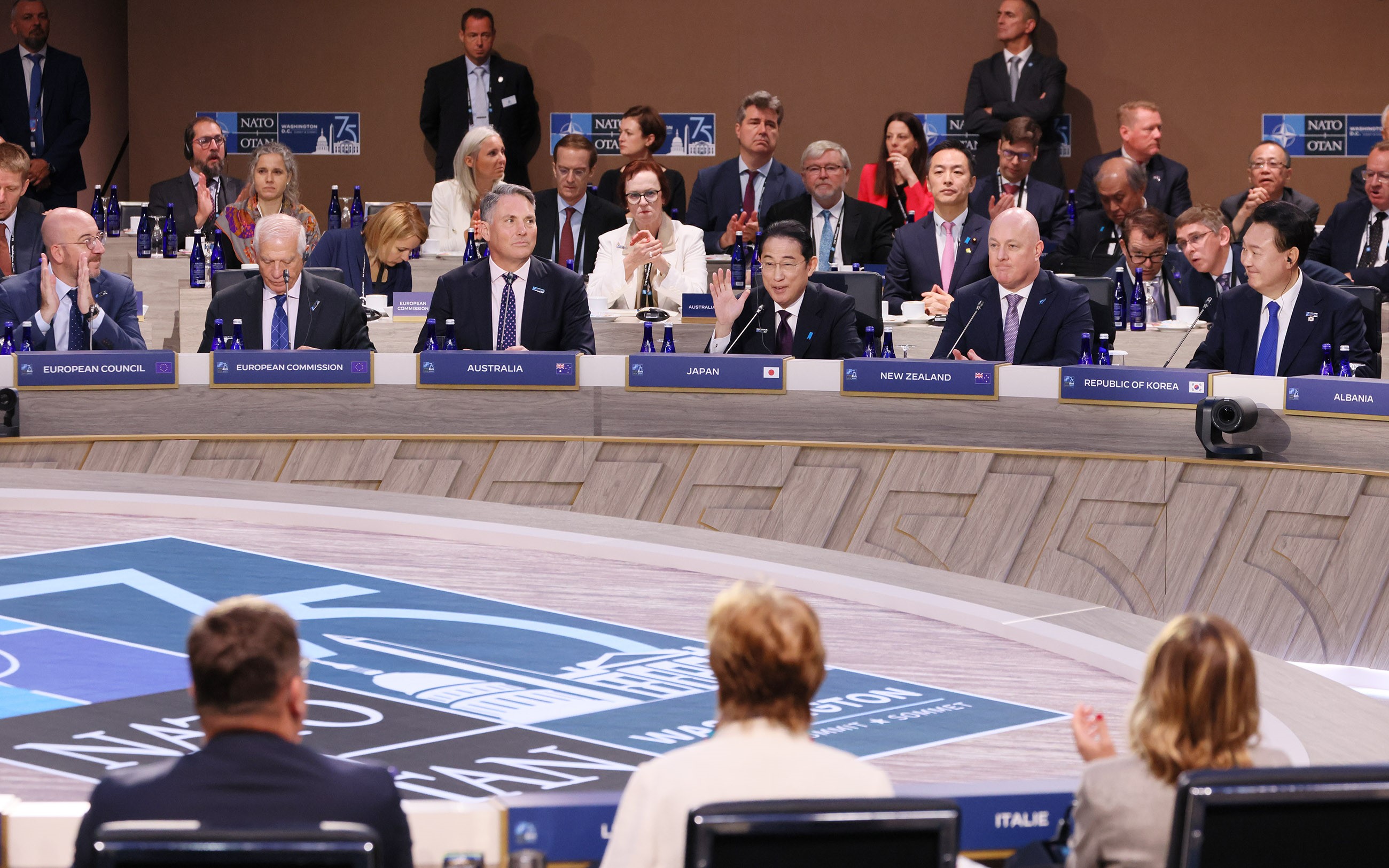Prime Minister Kishida Attends the NATO Summit (Summary)
[Provisional Translation]
On July 11, commencing at 10:40 a.m. local time (July 11, 11:40 p.m. JST) for approximately 2 hours and 30 minutes, Prime Minister KISHIDA Fumio, during his visit to Washington D.C., USA, attended the Meeting of the North Atlantic Council at the level of Heads of State and Government, Indo-Pacific Partners and the European Union (the Partners Session) of the NATO Summit. The overview of the meeting is as follows.
- Prime Minister Kishida attended the Partners Session of the NATO Summit. The session was attended by H.E. Mr. Jens Stoltenberg, Secretary General of the NATO and leaders from 32 NATO member states as well as Indo-Pacific partners (IP4: Japan, Australia, New Zealand, the Republic of Korea) and the EU. At this session, the international security environment, including Russia's aggression against Ukraine and the situation in the Indo-Pacific, and the future cooperation between NATO and IP4 and other issues were discussed.
- During the Summit, Prime Minister Kishida made the following remarks:
(1) I attended the NATO Summit as I did last year and the year after last. I have consistently expressed my strong sense of crisis that “Ukraine today may be East Asia tomorrow,” and that the security of Euro-Atlantic and Indo-Pacific is inseparable. I welcomed the fact that many leaders share such recognitions and are increasing their interests and engagement in the Indo-Pacific.
(2) Japan’s position to strongly support for Ukraine and impose sanctions against Russia remains unchanged. Last month, Japan became the first non-Atlantic country to sign a bilateral document with Ukraine, reiterating the fact that the issue of Ukraine is not only the issue of European, but also the issue for the entire international community. I also attended the Summit on Peace in Ukraine in Switzerland, where I emphasized that we should realize a "just and lasting peace" based on international law, including UN Charter, and that unilateral attempts to change the status quo by force or coercion must not be justified. Japan has contributed approximately $67 million to NATO’s Trust Fund since last year to provide the Counter-Unmanned Aircraft Detection Systems for Ukraine. Japan will also work closely with NATO in supporting Ukraine in the medical field, which has become one of the flagship projects between IP4 and NATO. In such various ways, Japan will continue to provide solid support and cooperation.
(3) In the Indo-Pacific, Japan is seriously concerned about the recent moves to advance Russia-North Korea military cooperation which not only leads to further deterioration of the situation in Ukraine but also affects the security of the region surrounding Japan. Any attempt to unilaterally change the status quo by force in the East and South China Seas is unacceptable.
(4) In order to respond to such a severe security environment, Japan has been working on making the level of its budget, for both the fundamental reinforcement of defense capabilities and complementary initiatives, reach 2% of our GDP in FY 2022, and has been strengthening cooperation with like-minded countries. It is also important to deepen cooperation between the IP4 and NATO, we welcome the IP4-NATO flagship projects (*1).
(5) Regarding the Japan-NATO cooperation, Japan intends to promote the following cooperations based on the ITPP (*2).
(a) Japan will strengthen a classified information sharing system with NATO.
(b) Japan will strengthen cooperation in the cyber field, including Japan’s participation in cyber defense exercises organized by NATO. As part of this effort, the Japan-NATO Cyber Dialogue was held for the first time last year.
(c) Japan plans to dispatch new personnel to the NATO Strategic Communications Centre of Excellence (NATO StratCom COE) in Latvia. Japan will invite NATO and its member states and the IP4 to a meeting on strategic communications to be held in Japan during this FY 2024;
(d) Japan and NATO are coordinating to realize joint exercises in the Europe-Atlantic region this year.
(6) Japan will continue to strengthen coordination with like-minded countries such as NATO member states and make efforts to uphold a free and open international order based on the rule of law.
(*1) IP4-NATO flagship projects:
Projects for pursuing practical cooperation in four areas: (1) support to Ukraine, (2) Cyber Defense, (3) hostile information, including disinformation, and (4) Technology.(*2) ITPP: Individually Tailored Partnership Programme
